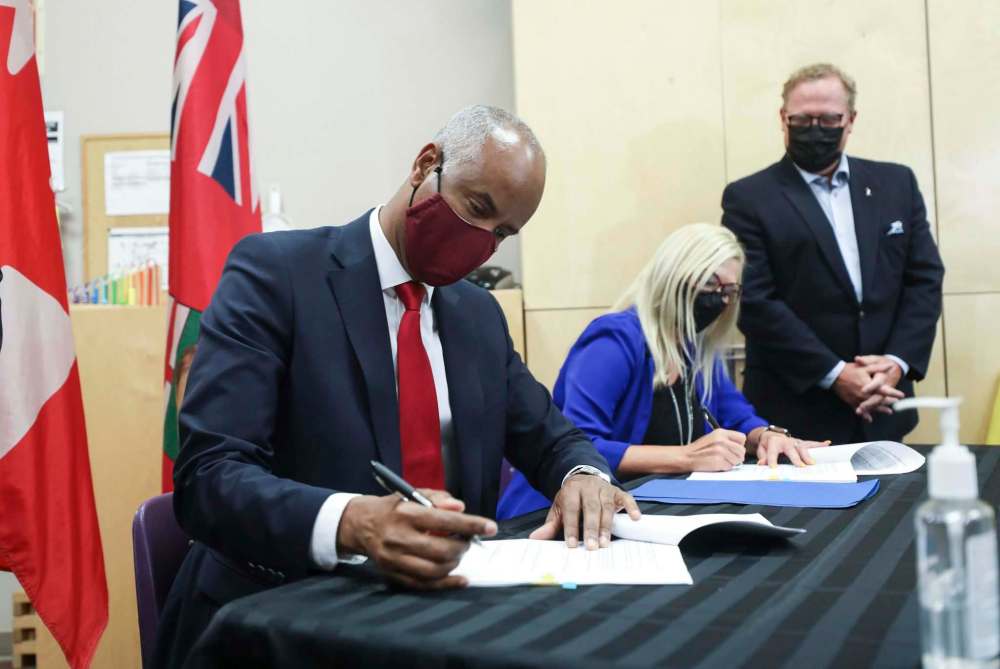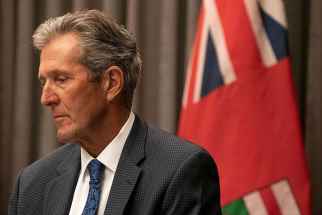A good child-care deal for Manitoba
Read this article for free:
or
Already have an account? Log in here »
To continue reading, please subscribe:
Monthly Digital Subscription
$19 $0 for the first 4 weeks*
- Enjoy unlimited reading on winnipegfreepress.com
- Read the E-Edition, our digital replica newspaper
- Access News Break, our award-winning app
- Play interactive puzzles
*No charge for four weeks then billed as $19 plus GST every four weeks. Offer only available to new and qualified returning subscribers. Cancel any time.
Read unlimited articles for free today:
or
Already have an account? Log in here »
Hey there, time traveller!
This article was published 10/08/2021 (1233 days ago), so information in it may no longer be current.
While praise for the Progressive Conservative government of Premier Brian Pallister has been rare as rain these days, there was opportunity on Monday for congratulations over the $10-a-day child care deal negotiated with the federal government.
The signing of the agreement, which neither the premier nor Prime Minister Justin Trudeau attended, puts in motion $1.2 billion the federal government has pledged to provide to Manitoba over five years to reduce the cost of child-care spaces. While Mr. Pallister was attending to obligations in rural Manitoba, Families Minister Rochelle Squires represented the provincial government in Winnipeg at the signing of the child-care deal with federal Minister of Families, Children and Social Development Ahmed Hussen.
Manitoba signs $1.2B child-care deal with feds

Posted:
Shorter waits and lower fees for quality child care in Manitoba are part of the $1.2-billion, five-year deal the province signed with the federal government on Monday.
It was not a take-it-or-leave-it proposal from Ottawa. The Liberals’ quest for universal child care — a rather frenzied pursuit in advance of an expected fall federal election — has in recent weeks led to deals with six other provinces before Manitoba, with each province negotiating individual arrangements unique to its needs. At first glance, the Manitoba deal seems to enhance child care in several ways.
One significant improvement is that the new Manitoba plan includes 1,700 extended-hour spaces in evenings and on weekends. That will be welcome for the large number of parents who work part-time, or work temporarily in the gig economy, or work hours other than weekdays. Such parents are often frustrated trying to find child care within current Manitoba facilities that prefer children be signed up for full-time care, Monday through Friday.
Another encouraging change is that the new Manitoba arrangement appears to be less about babysitting and more about early-childhood education. Research shows high-quality childhood education delivers lifelong benefits, particularly for kids from low-income families, but it requires trained early-childhood educators, who are notoriously underpaid and hard to recruit in Manitoba. Ms. Squires said the new plan will set a salary floor of $25 an hour for early learning and childhood educators.
The Manitoba agreement also aims at inclusivity, giving families access to culturally responsive services, which is particularly valuable in a province with a high proportion of children from Indigenous and new-immigrant families. It also aspires to be fully inclusive of children with disabilities.
That the deal is good for the household budgets of Manitoba families is indisputable, as they would see a 50 per cent reduction in average fees in regulated child-care spaces by the end of 2022 as government funding creates 23,000 spaces for kids aged six and under.
Whether the deal is too good to be true remains to be seen. Previous federal governments, both Liberal and Conservative, have tried in recent decades to improve national child care, but the various versions were cancelled or changed by subsequent governments.
What’s different this time is the pandemic. The Liberals’ drive for $10-a-day child care comes at a critical stage of this country’s recovery from the devastation of COVID-19. Economic recovery will depend on strong participation in the workforce, including by parents who want to work but face the obstacle of affordable, high-quality child care.
Given Mr. Pallister’s prickly relationship with the federal government in general and Mr. Trudeau in particular, there were likely some mixed feelings involved in supporting an initiative that will undoubtedly help the Liberals in an upcoming federal election. But if ever there were a time to put aside partisan politics, this is it. Universal child care warrants universal support.







